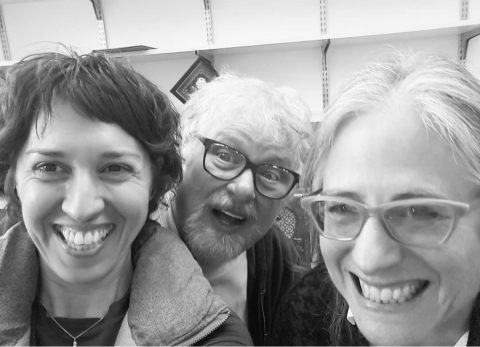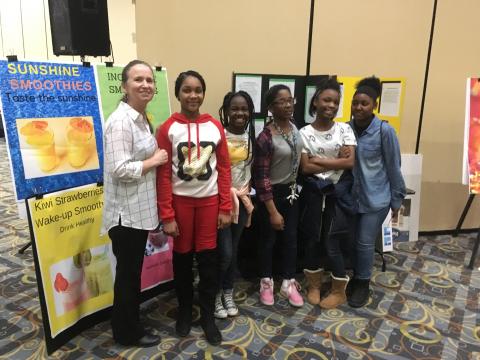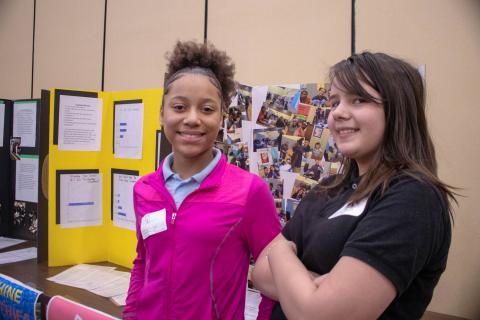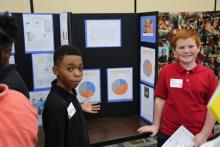News
NGSS Curricula Is For All Teachers: Use Our Roadmaps!

Health in Our Hands (HiOH) was recently featured in a blog and webinar hosted by THE Journal and STEAM Universe. Research associate Idit Adler and project manager Renee Bayer were invited to talk about how the project-based curriculum, HiOH, brings the vision of the NGSS into classrooms using Roadmap. Partnering with Professor Elliot Soloway at the University of Michigan College of Engineering we shared our experience about how teachers can use HiOH and its visualization through RoadMap technology to shift their instructional practices to align with NGSS. THE Journal is dedicated to K12 educational technology.
HiOH is a research project led by CREATE for STEM Institute at Michigan State University in a community-academic-school partnership, supported by the National Institutes of Health Science Education Partnership Award (SEPA). Designed to meet NGSS, HiOH is a coordinated set of classroom and community activities intended to give youth and adults an understanding of modern concepts in genetics using diabetes and addiction as real-world contexts. Students and their families can use these concepts to appreciate the importance of both genetic and environmental factors in their risk for disease.
Young People Learn about Careers in Addiction Research Through Scientists' Stories
Introducing young people to the work of scientists and encouraging them to pursue STEM-related careers is an important aspect of a new research-based science curriculum for middle school called Health in Our Hands: How can looking for thrills make me miserable? The unit, which explores the biology of addiction, starts with a video with teens’ testimonials about addiction to vaping. Students investigate the brain’s reward system from an evolutionary perspective, and examine its role in addictive behavior.
To make career connections, we partnered with public health students who produced wonderful videos as part of their course requirements. The videos featured plant biologist Dr. David Lowry from Michigan State University who studies evolutionary genomics and neuroscientist Dr. Shelly Flagel from University of Michigan who studies addiction in mice models. Our thanks to Ross Baiers, Madison Hafitz, and Erika Holiday, Health Behavior Health Education masters students from University of Michigan School of Public Health!
Health in Our Hands (HiOH) is a research project led by CREATE for STEM Institute at Michigan State University in a community-academic-school partnership, supported by the NIH Science Education Partnership Award (SEPA).
Get Ready for the Next Generation of Scientists!

Many people think that young people can't conduct meaningful research and help solve problems in their community. Sixth grade students from Mrs. Savoie’s class at Freeman Elementary School were invited to present results of their community action research project, "How can healthy smoothies attract consumers?" at the 2019 Healthy Flint Research Coordinating Center (HFRCC) Annual Symposium on March 15, 2019. Their presentation gave visibility to their research and the wonderful work that Flint students are doing in their science classes. The HFRCC symposium also gave students the opportunity to learn about other research conducted about health in Flint.
The community action research project was conducted as part of the science curriculum, Health in Our Hands: What controls my health?” during which 6th graders in Flint Community Schools studied type 2 diabetes to appreciate the importance of both genetic and environmental factors in their risk for disease. The curriculum connected students to real-world experiences. One in 10 adults in Michigan are diagnosed with diabetes, which like many common diseases, is caused by a combination of both genetic and environmental factors. During the unit, students investigated how lifestyle options for healthy foods and exercise help prevent or reduce diabetes. For the final project, the classes conducted an action research project to improve our school or neighborhood to help prevent or reduce diabetes.
Mrs. Savoie’s class chose to research healthy smoothies. First, they researched what makes for a healthy smoothie. They consulted with Katherine Alaimo, Professor of Food Science and Human Nutrition at Michigan State University and developed their own healthy smoothie recipes. The class then organized a healthy smoothie event where smoothies were served to family members and school friends. “Pink” was a very popular color for smoothies, although some people liked knowing the healthy ingredients when making choices. Students reported that more smoothies are being served at home.
Students were funded by a grant from the University of Michigan Flint-Discovering Place and the HFRCC. Health in Our Hands is a research project led by CREATE for STEM Institute at Michigan State University in partnership with Flint Community Schools, University of Michigan School of Public Health, Community-based Organization Partners of Flint, Sloan Museum, Flint Public Library, Concord Consortium in Massachusetts and Detroit Public Schools Community District, University Prep Science and Math Middle School, Charles W. Wright Museum of African American History, Michigan Science Center, Detroit Public Library, Friends of Parkside in Detroit. This project is supported by a Science Education Partnership Award (SEPA), National Institute of General Medical Sciences (NIGMS), Award Number R25 GM129186-05.
Student Voices Make Important Contributions to Community Health Through Science

Young people from Flint and Clio area schools demonstrated that they have something to say about ways to improve the health of their communities. On Tuesday January 15th, more than 300 sixth graders from Flint Community and Clio Area Schools presented together at the Youth Diabetes Health Summit in downtown Flint. The student teams reported the findings from their Community Action Projects to answer the question, “How can we work together to make our community healthier?” The students have been studying Type 2 diabetes in science class as part of a new curriculum called, “Health in Our Hands: What Controls My Health?” They discovered how genetic risk factors and environmental factors such as poor diet and lack of exercise, put them at risk for disease. For their final project, students conducted a community action research project to improve their school or neighborhood to help prevent or reduce diabetes.
Sixth grade classes studied factors that affect healthy lifestyles. Students at Doyle-Ryder Elementary School in Flint and Carter Middle School in Clio investigated how raising awareness about the amount of sugar we eat can affect students’ food choices. Students at Freeman Elementary in Flint held a smoothie contest to study strategies for influencing family members to choose healthy smoothies. Two classes at Durant-Tuuri-Mott and Eisenhower Elementary Schools looked at the effects of peer pressure and “food buddies” on healthy food choices. Students at Holmes STEM Academy, Durant-Tuuri-Mott, and Neithercut Elementary Schools in Flint investigated the effects of different types of exercise and the amount of screen time on students’ well being.
At the Summit, students shared insightful, evidenced-based recommendations with over 75 family members and community experts. “The young people told me that when you change your diet and exercise habits you feel better, more focused, and get along better with other people,” said Pastor Jimmie Whitaker of MCAR Men's Community Action Resource. “I loved hearing the students talk about their work!” said Leyla Sankar of University of Michigan-Flint. “It raised awareness about and fostered empathy for individuals with diabetes. They definitely learned a lot about healthy choices.”
Similarly, on Thursday January 17th 190 seventh grade students at Carman-Ainsworth Middle School shared results from their community action projects at the Youth Addiction Prevention Health Summit. These students have been studying the biology of addiction in the new science curriculum called “Health in Our Hands: How can looking for thrills make me miserable?” to understand modern concepts in genetics. The students investigated how the brain’s reward pathway developed through natural selection and why this system can lead to addictive behavior in modern life. For their final project, students researched “How does social media affect my well-being?” Students shared results of surveys of family members, friends and students in other grades. They reported on the duration of use of different kinds of social media and effects on feelings, attitudes, and behaviors. Some students reduced their personal use of social media voluntarily and shared the impact on their own well-being. Over 25 family members and volunteers from the community attended the summit during one or more class hours of the day. “The students’ presentations helped me realize how knowledgeable they are about topics of their own interest and that they are truly experts in their own lives,” reflected Danielle McCoy of the Genesee County Health Department.
During both health summits on diabetes and addiction, students demonstrated that they can conduct research and present scientific information that can improve the lives of their loved ones. “Projects like these can have an impact on the community as the youth all noted they shared their results with their family and families were making changes,” said Dianna LaBonte, from Health Alliance Plan.
Community experts were also invited to introduce themselves and their career in a health or STEM-related field. Some shared information about a resource, program, or opportunity related to health or STEM, and invited students to extend their interest in science and community action outside of the classroom.
Behind every great student presentation is a dedicated and skillful teacher deserving of recognition and appreciation. Health in Our Hands included teachers from three participating school districts - Flint Community Schools: Kelley Blondin, Scott Davis, Whitney Ennis, Kathy Savoie, Robyn Seelye, Annette Sparks, David Sutton and Diane Baker-Williams; Clio Area Schools: Merin Brotherton; and Carman-Ainsworth Community Schools: Adam Cassel and Melissa Warburton.
Health in Our Hands, funded by NIH-Science Education Partnership Award (SEPA), is a project of MSU-CREATE for STEM Institute in collaboration with UM School of Public Health and other partners. The project is developing and testing new learning materials that blend classroom instruction and community-based learning to give both students and community members opportunities to apply ideas about gene-environment interactions and natural selection to their lives. The project is supported by the Health in Our Hands-Flint/Genesee Partnership: Community Based Organization Partners of Flint, Flint Community Schools, Genesee County Health Department, Genesee Intermediate School District, Genesys Health System, Greater Flint Health Coalition, Health Alliance Plan, Michigan State University-CREATE for STEM Institute & Extension, University of Michigan-Flint Discovering Place, and University of Michigan School of Public Health.
For more information, watch Flint NBC25 report: Flint, Clio schools team up for youth diabetes summit
Health in Our Hands Hosts Two Health Summits in the Community

CREATE for STEM Institute of Michigan State University, the University of Michigan School of Public Health, and partners in Flint and Genesee County invite the public to attend two events hosted by Health in Our Hands. For more information and to RSVP:
“Youth Diabetes Health Summit”
Tuesday, January 15, 2019 from 9:30 a.m. – 1:00 p.m.
Riverfront Banquet Center, 1 Riverfront Plaza, Flint, MI 48502.
Final Presentations by 6th graders from Flint Community Schools and Clio Community Schools
“Youth Addiction Prevention Health Summit”
Thursday, January 17, 2019 from 9:30 a.m. – 1:00 p.m.
Sylvester Broome Empowerment Village, 4119 N Saginaw St Flint, MI 48505.
Final Presentations by 7th and 8th graders from Flint Community Schools and Carman-Ainsworth Community Schools
Health in Our Hands (HIOH) coordinates classroom and community activities to give middle school youth and adults an understanding of modern concepts in genetics. Using a research-based science curriculum, students investigate diabetes and addiction and use these real-world contexts to appreciate the importance of both genetic and environmental factors in their risk for disease. For their final project, students conduct an action research project to improve their school or neighborhood to help prevent or reduce diabetes and addition. Students present the results and recommendations at a Youth Health Summit to their peers, family and community. The project is supported by the Health in Our Hands-Flint/Genesee Partnership: Community Based Organization Partners of Flint, Flint Community Schools, Genesee County Health Department, Genesee Intermediate School District, Genesys Health System, Greater Flint Health Coalition, Health Alliance Plan, Michigan State University-CREATE for STEM Institute & Extension, Sloan Museum, Flint Public Library, University of Michigan-Flint Discovering Place, and University of Michigan School of Public Health


